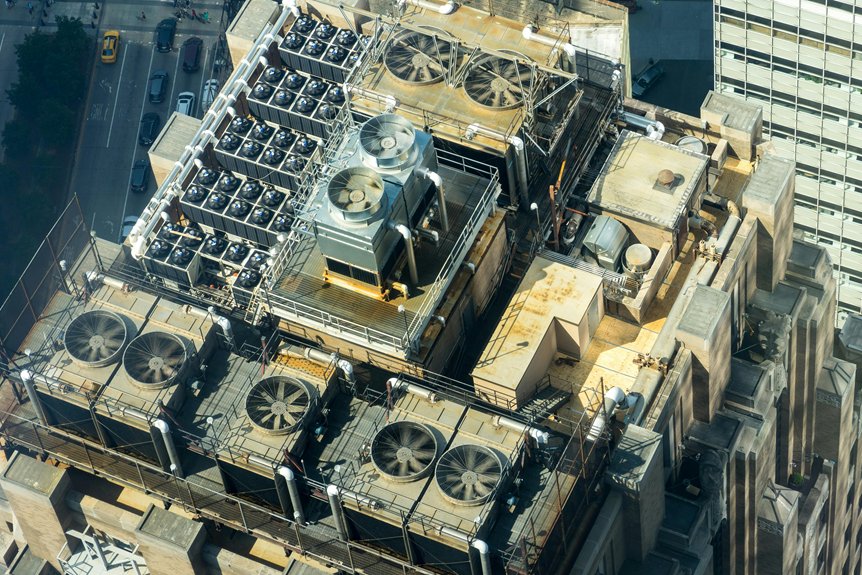Choosing the right roofing system for your Denton industrial building requires careful consideration of durability, energy efficiency, and environmental impact. Metal, membrane, and foam options each offer unique advantages that can meet specific structural and operational needs. To optimize long-term performance and cost savings, you need to evaluate these systems based on local weather conditions, sustainability goals, and budget constraints. Understanding the nuances of each solution is critical to making an informed decision that supports your facility’s resilience.
Metal Roofing Systems for Industrial Buildings
Metal roofing systems are a popular choice for industrial buildings in Denton due to their durability, longevity, and resistance to harsh environmental conditions.
These systems support advanced solar integration, allowing you to install photovoltaic panels seamlessly, enhancing energy efficiency without compromising structural integrity.
The versatility of metal roofs also enables extensive aesthetic customization, including color options, panel profiles, and finishes, aligning with your building’s design goals.
Metal roofs resist corrosion and extreme weather, reducing maintenance needs and ensuring long-term performance.
Their reflective properties can help manage heat gain, further improving energy efficiency.
Additionally, metal roofing systems can contribute to building resilience by providing reliable protection against severe storms and other natural threats.
Built-Up Roofing (BUR) Systems
Built-up roofing systems consist of multiple layers of asphalt and reinforcing felts, creating a robust, multi-layered membrane. These layers augment waterproofing capabilities and resist membrane punctures, making them suitable for demanding industrial environments.
Their long-established durability guarantees reliable performance over extended service lives with proper maintenance.
Multiple Layer Composition
Because durability and waterproofing are critical for industrial buildings, multiple-layer composition systems, commonly known as Built-Up Roofing (BUR) systems, are widely used in Denton. These systems consist of alternating layers of bitumen and reinforcement materials, creating a resilient barrier against water infiltration.
You’ll find that adding insulation layers enhances thermal efficiency, reducing energy costs and maintaining a stable internal environment. The multiple layers also allow for aesthetic enhancements, such as surface coatings that improve reflectivity or texture.
Each layer is carefully installed to maximize adhesion and resilience, ensuring long-term performance. This layered construction provides a robust, customizable solution that meets the demanding needs of industrial structures, combining waterproofing, thermal insulation, and visual appeal in a single all-encompassing system.
Enhanced Waterproofing Capabilities
Enhanced waterproofing capabilities are a key advantage of Built-Up Roofing (BUR) systems, making them ideal for Denton’s industrial buildings. Their multi-layer construction creates a robust barrier against water infiltration, notably improving storm resistance.
Each ply, typically composed of asphalt and reinforced felts, is overlain with a protective surfacing that enhances durability. Sealant technology integrated into BUR systems further seals joints and seams, preventing water ingress even during severe weather events.
The overlapping layers provide redundancy, so if one layer sustains minor damage, others continue to offer protection. This multi-faceted approach ensures the roof maintains its waterproof integrity over time, reducing maintenance needs and safeguarding the building’s structure from water-related deterioration.
Long-Established Durability
Thanks to their proven track record, BUR systems have demonstrated exceptional durability over decades of service in industrial roofing applications. Their historical resilience stems from multiple asphalt layers, which provide a robust, cohesive barrier against environmental stressors.
This layered construction enhances long-term performance by offering excellent resistance to UV radiation, temperature fluctuations, and mechanical damage. The asphalt’s inherent flexibility accommodates structural movements, reducing cracking and leaks over time.
Additionally, the mineral surfacing protects the underlying asphalt from UV degradation, prolonging system lifespan. Regular maintenance and proper installation further guarantee consistent durability.
Modified Bitumen Roofing Options
Modified bitumen roofing offers excellent durability and flexibility. This allows it to withstand thermal expansion and contraction without cracking.
Proper installation methods, such as torch-applied or cold-adhesive, guarantee long-term performance and ease of maintenance.
Understanding these factors helps optimize the system’s lifespan and reduce ongoing repair costs.
Durability and Flexibility
Because of their inherent layered structure, modified bitumen roofing systems offer a compelling combination of durability and flexibility suited for industrial applications. The multiple layers enhance insulation properties, providing superior thermal resistance essential for energy efficiency.
This multilayered design also distributes stress evenly, improving resistance to thermal expansion, contraction, and mechanical damage. The flexibility of modified bitumen allows it to accommodate substrate movement without cracking, extending lifespan and reducing repair costs.
Additionally, the material’s surface can be finished with various coatings to improve aesthetic appeal, ensuring the roof maintains a clean, professional look over time.
Installation and Maintenance
Are you aware of the precise procedures required for the effective installation and ongoing maintenance of modified bitumen roofing systems?
Proper installation techniques involve cold or heat-applied methods, ensuring seamless adhesion and uniform layering. Surface preparation must eliminate debris, moisture, and contaminants to guarantee ideal bonding.
During installation, pay close attention to membrane seam overlaps, flashing integration, and insulation compatibility.
Maintenance protocols include routine inspections for blistering, cracks, or membrane deterioration, especially after severe weather events. Prompt repairs should address any issues to prevent leaks and structural damage.
Regular cleaning of debris and debris removal from drains is essential.
Adhering to these detailed installation techniques and maintenance protocols maximizes system longevity and performance, safeguarding your industrial building investment.
Single-Ply Membrane Roofing Solutions
Single-ply membrane roofing systems have gained prominence in Denton industrial buildings due to their durability, ease of installation, and cost-effectiveness. These systems utilize thermoplastic or thermoset membranes, such as TPO, EPDM, or PVC, which offer high resistance to weathering, chemicals, and UV exposure.
Their solar reflective properties enhance energy efficiency by reducing heat transfer, lowering cooling costs, and improving indoor climate control. The lightweight nature of single-ply membranes simplifies installation and minimizes structural load demands.
They’re often installed with reflective coatings that further boost energy savings. Maintenance requirements are minimal, and their seamless design reduces leak risks.
Spray Polyurethane Foam (SPF) Roofing
Spray Polyurethane Foam (SPF) roofing offers an advanced, seamless insulation and waterproofing solution for Denton industrial buildings. Its spray foam advantages include high R-value, excellent adhesion, and a monolithic membrane that eliminates seams and gaps.
During foam roofing installation, the foam is spray-applied directly onto the substrate, creating a continuous, airtight barrier that enhances energy efficiency and prevents water infiltration. SPF roofing is lightweight, reducing structural load, and its seamless nature minimizes potential leak points.
Additionally, SPF can be quickly applied, allowing for faster project completion. The durability of foam roofing, combined with its insulation properties, makes it an ideal choice for industrial facilities seeking reliable, long-term performance with minimal maintenance.
Thermoplastic Polyolefin (TPO) Roofing
Have you considered Thermoplastic Polyolefin (TPO) roofing as a durable, energy-efficient solution for Denton industrial buildings? TPO roofing features a single-ply membrane made from a blend of polypropylene and ethylene-propylene rubber, offering excellent resistance to UV radiation and chemical exposure.
Its reflective surface enhances energy efficiency by reducing cooling costs, making it ideal for large industrial facilities aiming to lower operational expenses. Additionally, TPO has a minimal environmental impact due to its recyclability and absence of chlorine or chlorine-based compounds, which contribute to ozone depletion.
Its seamless installation minimizes vulnerabilities like leaks, ensuring long-term durability. Overall, TPO’s combination of high reflectivity, chemical resistance, and eco-friendliness makes it a strategic choice for industrial buildings seeking sustainable, energy-efficient roofing solutions.
Considerations for Selecting the Right Roofing System
Selecting the appropriate roofing system for Denton industrial buildings requires a thorough evaluation of several technical and operational factors. You must consider energy efficiency, as a well-insulated roof reduces cooling and heating costs while minimizing environmental impact.
Assess the building’s structural capacity to support different roofing materials, guaranteeing durability under local weather conditions. Aesthetic appeal also plays a role, especially if the building’s exterior visibility influences your branding or property value.
Compatibility with existing infrastructure, ease of maintenance, and lifespan are critical considerations. Additionally, evaluate the roofing system’s resistance to UV exposure, chemical exposure, and ponding water.
Conclusion
Choosing the most suitable roofing system for your Denton industrial building requires balancing durability, energy efficiency, and environmental impact. Metal roofs with reflective coatings, foam insulation, and TPO membranes offer enhanced lifespan and sustainability. Assess your building’s structural requirements, local climate, and long-term maintenance costs to identify the best solution. Implementing a technically sound, resilient roofing system ensures maximum performance, reduces energy expenses, and supports your facility’s operational efficiency over its lifespan. For more information on how to schedule your free roof inspection, call us at (405) 543-2920 or visit us online at Top View Roofing.


















